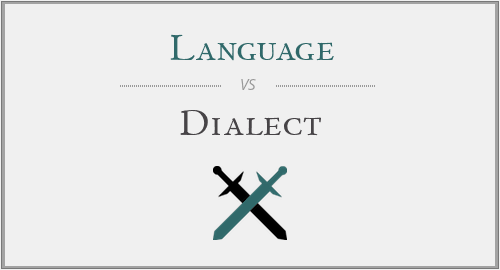
There is a fine line between a language and a dialect. In this article, you will learn about their differences and their similarities.
But when, exactly, does a language become a dialect?
For example:
If Latin was the mother language, then Italian, French, Portuguese, and Spanish were offshoots of Latin and developed as dialects of Latin.
Then, they became languages in their own right. Italian became its own mother language, French became its own mother language, and so on, with new dialects developing from each one.
Two dialects that come from the same language have common roots, although each dialect is different and reflects its unique development.
The Development of Languages and Dialects
People who spoke the same mother language were often separated geographically, sometimes completely isolated from each other, developing their own words, their own speech, and their own accents.
For example:
The Spanish language that is spoken in Spain is different from the Spanish that is spoken in South American, both of which began with the same original Spanish and can technically be considered dialects of Spanish.
The Portuguese that is spoken in Brazil and the Portuguese that is spoken in Portugal are both dialects of the original Portuguese.
Social class and educational levels can also influence the development of dialects, providing diversity of groups, and over time, a reinforcement of a certain linguistic patterns.
What is a Language?
• A language is a structured system of communication, a code with a standardized set of grammar rules.
• A language can be verbal, gestural, or written.
• Because a specific country or community often has a common language, it can be seen as a way of defining the country’s identity.
What is a Dialect?
A dialect is not a structured system and does not necessarily have the same structured set of grammar rules as the mother language.
• A dialect is usually verbal, not written.
For example:
A dialect can arise from a common geographical area, a common community, race, religion, educational status, or socio-economic class.
• Although many dialects can exist within a particular language, and can share many similarities with that language, dialects contain local words, linguistic patterns, grammar, phrases, and pronunciation that are specific and often consistent within their own dialect.
For example:
English is a mother language. It has many different dialects, such as American English, British English, Yorkshire, Quebec English, and more.
Although each dialect has its own accent and its own way of pronouncing words, people who speak these different dialects can still understand each other most of the time.
Another example that reflects the differences between dialects would be the words used to name food: in one Southern American dialect, a certain food is called shrimp; in another dialect, it might be called crawfish; in another dialect, it might be called crawdads.
Standardized Language
At some point, a country usually chooses a certain dialect to become its standardized version of the language.
This chosen dialect, then, becomes the version that is taught in the schools and used on official documents.
This standardized dialect becomes the most “correct” version of the language; in reality, it is no more correct than any other dialect would be.
Cultural considerations
For example:
English speakers in the US and English speakers in Australia do not experience the same contemporary culture even though their linguistic history might be based in similar roots. Their cultural differences are reflected in the development of their local dialects. .
Final Thoughts
*A mother language can have several dialects, but a dialect does not have many mother languages, only one.
*A language is written and spoken. A dialect is usually only spoken. That is, the rules of language are standardized and written, whereas the rules of dialects are not.
*A language is usually connected to a country; it is endorsed by the country as its official verbal and written language. Official documents and papers must be written in it.
A dialect is regional, spoken by a smaller group of people within the country. Even if a dialect is written down, it is not official.




Have a discussion about this article with the community:
Report Comment
We're doing our best to make sure our content is useful, accurate and safe.
If by any chance you spot an inappropriate comment while navigating through our website please use this form to let us know, and we'll take care of it shortly.
Attachment
You need to be logged in to favorite.
Log In